IMO OMG ACT NOW
12.12.2022

Today is the first day of the Marine Environment Protection Committee meeting, at the UN International Maritime Organisation (IMO) in London. And it’s the first time the IMO has welcomed delegates through its doors since 2019. We felt Ocean rebellion should be there to add our own welcome, after all a lot of the delegates came a long way.
When the delegates arrived we greeted them with flames and a black carbon fog of Heavy Fuel Oil (HFO). Then we added an oil slick with three Oil Heads vomiting oily gunge. Two dying suited figures crawled through the oil clutching their briefcases. One case said ‘ON A HIGHWAY TO HELL’ and the other ‘OUR FOOT ON THE GAS’, paraphrasing the recent words of Antonio Guterres, UN Secretary General.
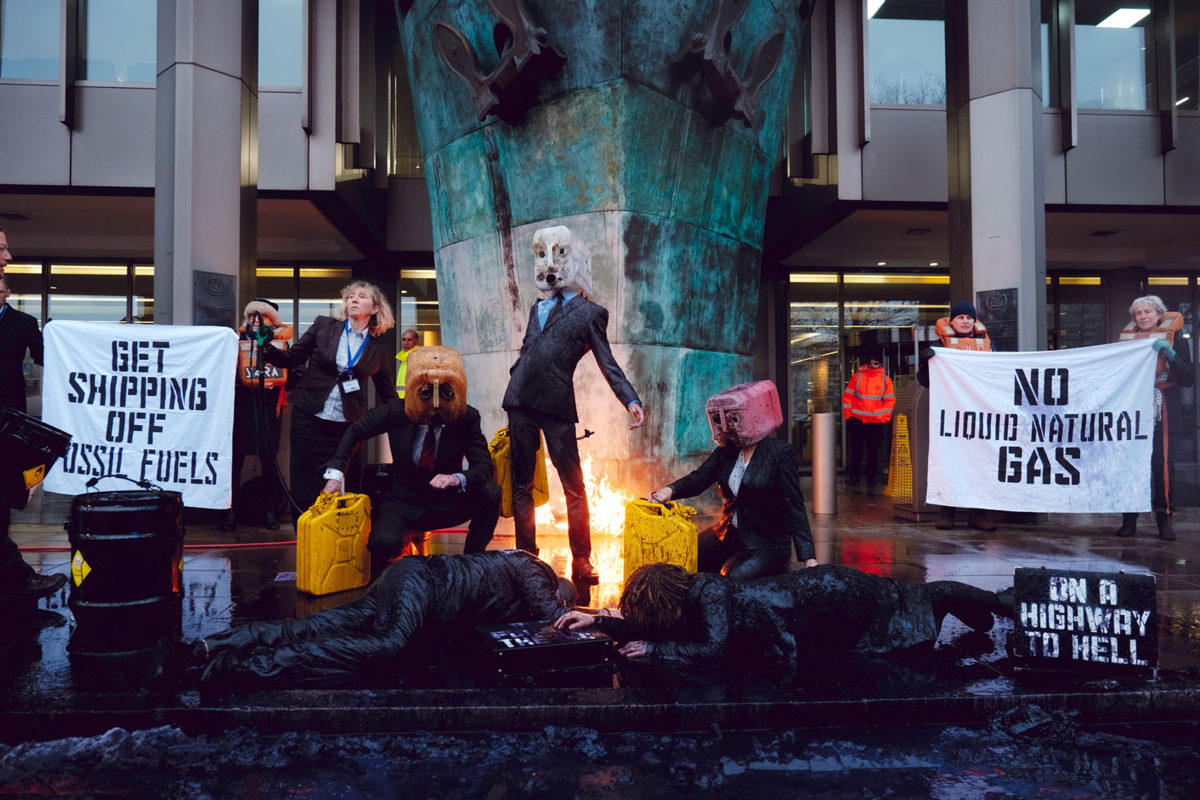
The fate of the Ocean depends on us all.
Our interventions depend on your support.
The dying (then dead) figures illustrate how the IMO’s refusal to tackle shipping pollution ahead of 2030 is destroying the Ocean and any chance we have of keeping anywhere near to the 1.5C demanded by the Paris Climate Agreement – an agreement brokered by the UN but one which one of its own bodies (UN IMO) can’t be bothered to act on.
And the Oil Heads tell the story of how the IMO still refuses to take simple actions like slow steaming, using cleaner distillates instead of HFO and less unnecessary shipping, preferring instead to listen to the oily advice of the fossil fuel lobbyists who always ask for ‘business as usual’.
While the oil heads ejected their vile HFO byproduct a group of seafarers wearing life jackets unfurled two banners ‘GET SHIPPING OFF FOSSIL FUELS’ and ‘NO LIQUID NATURAL GAS’. The latter refers to the latest shipping industry ‘answer’ to emissions – Liquid Natural Gas (LNG). The industry prefers the acronym LNG because it hides the fact it’s a fossil fuel, a fossil fuel that leaks methane rather than CO2. Methane has 80 times more ‘heating power’ over a 20 year period than CO2 and will accelerate climate chaos – once again showing how little shipping cares about the climate and how much it loves the fossil fuel industry.
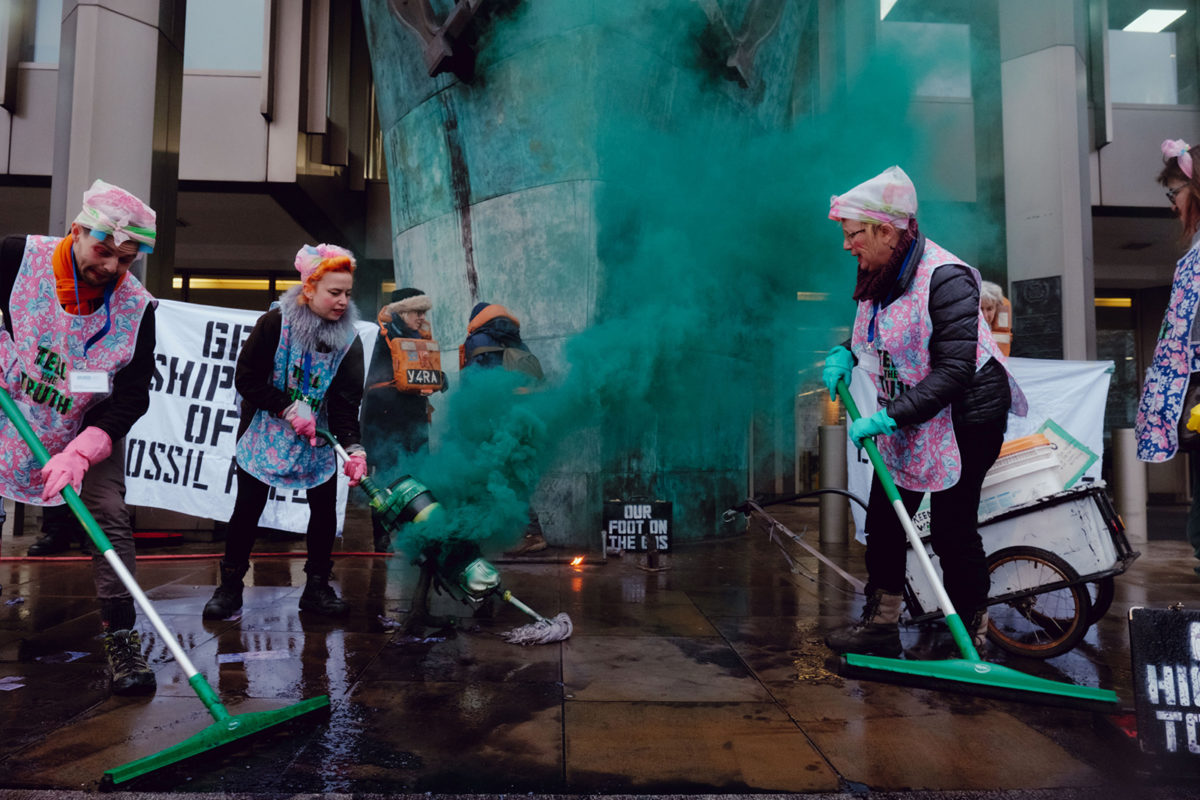
Afterwards the ‘dirty scrubbers’ arrived to clean up the oil heads’ mess with their ‘greenwash’.
Paid off by the shipping industry the ‘dirty scrubbers’ revealed how the IMO is allowing the fossil fuel industry to continue burning HFO at sea. HFO is a fossil fuel distillation byproduct that’s so toxic its use is banned on land – it’s highly acidic Q3, full of nitrogen oxides (a major cause of respiratory diseases) and has been linked to 400,000 premature deaths worldwide per year (at a health cost of $50 billion).
The IMO is failing in its duty to meet the Paris Climate Agreement. It must act now to halve shipping emissions before 2030, advise against any fossil fuel subsidies and demand member states start severely taxing shipping fuel. All fossil fuel lobbyists must be ejected from committees and black-listed for their consistent bad influence on policy making, all IMO processes must be made transparent and open to scrutiny.
The IMO is currently revising its existing climate strategy.
The IMO only aims to halve shipping emissions by 2050. Delegates are meeting in London 12 – 16 December for the Marine Environment Protection Committee (MEPC 79). The strategy revision is set to be concluded at MEPC 80 in 2023.
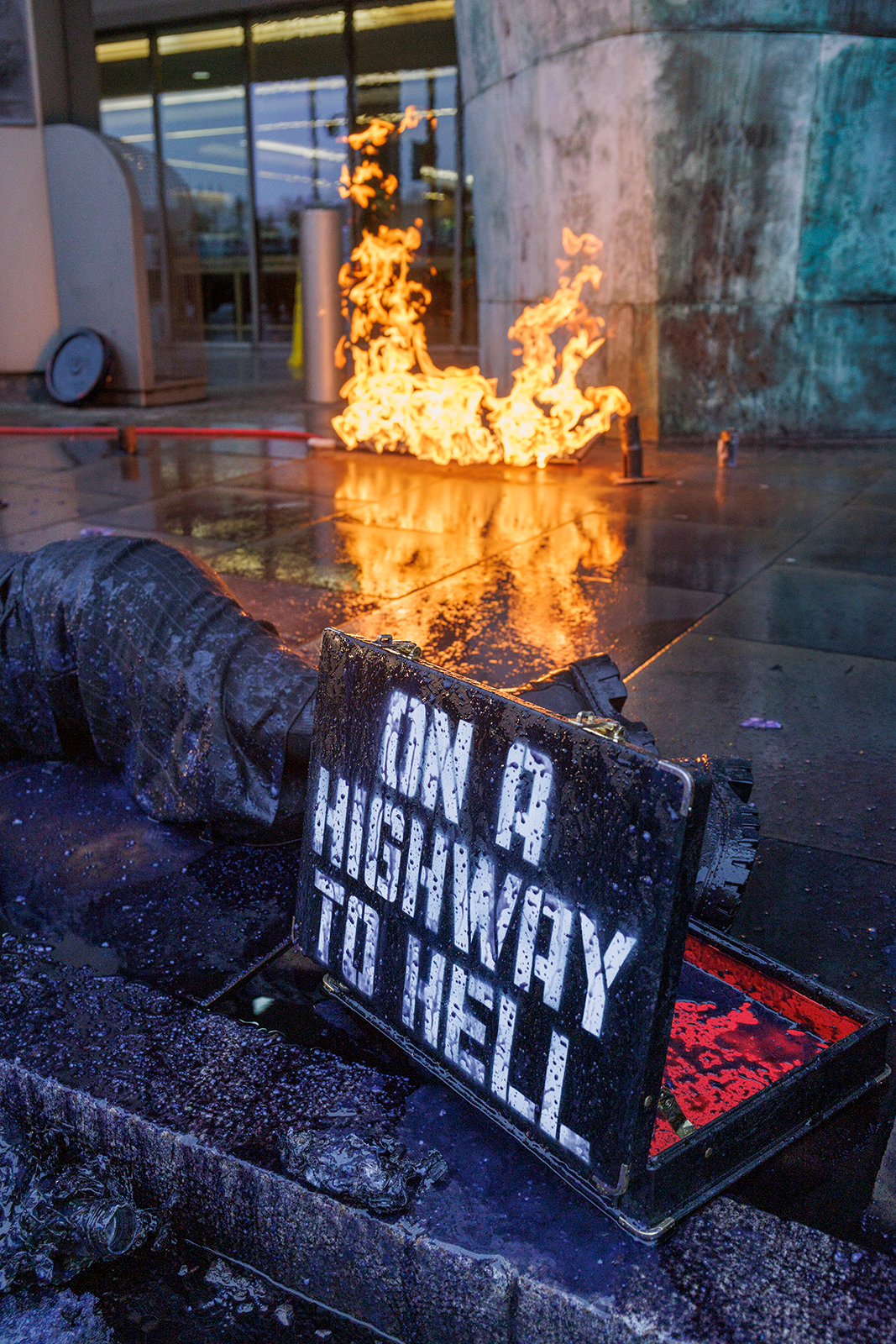
HFO and the IMO
The IMO continues to ignore its duty to govern shipping emissions. By allowing ships to burn HFO the IMO is significantly increasing shipping’s contribution to CO2 emissions rather than reducing them in line with the Paris Agreement. Furthermore black carbon from burnt HFO falls as soot and makes the ice caps absorb more heat and melt, further accelerating the terrifying feedback loops of planetary heating which are already killing millions and threaten all our lives.
Black carbon is especially dangerous when emitted by ships in the Arctic. IMO has been discussing rules for black carbon for more than a decade and the best they have to show for it is a commitment for a voluntary switch to cleaner fuels. The shipping industry has shown themselves incapable of self-regulation and are putting countless lives at risk. The time is now for a binding rule to tackle this potent source of climate heating.
The IMO must stop this stupidity now – voluntary switching has never worked, when has any industry ever volunteered any meaningful commitment to the environment? The IMO must act to end HFO use now – not just in the Arctic but everywhere – if it is illegal to burn a fuel type on land then it should be illegal to burn it at sea. After all, much of it eventually ends up in the same place – our lungs.
The fate of the Ocean depends on us all.
We’ll let you know what we’re doing to help.

Dirty Scrubbers
Our dirty scrubbers often clean up the dirty secrets of the oil and shipping industries. Part cleaner, part greenwasher they are adept at misleading the public. But this time they’ve gone a step further.
Not only is the IMO greenwashing fossil fuel use, it’s also proposing ‘scrubbers’ to do the same for ships. These scrubbers stop the worst HFO emissions entering the atmosphere: that’s good right? Well not if the scrubber turns it into an acidic solution and pumps it into the Ocean. So while still polluting the air the IMO is also now directly acidifying the sea – that’s surely the definition of greenwash!
So when our dirty scrubbers empty their buckets of non-toxic byproduct into the drain, it’s a perfect illustration of what the IMO is doing with the toxic byproduct of HFO – emptying it straight into the Ocean. The IMO’s ‘solution’ is a toxic solution.
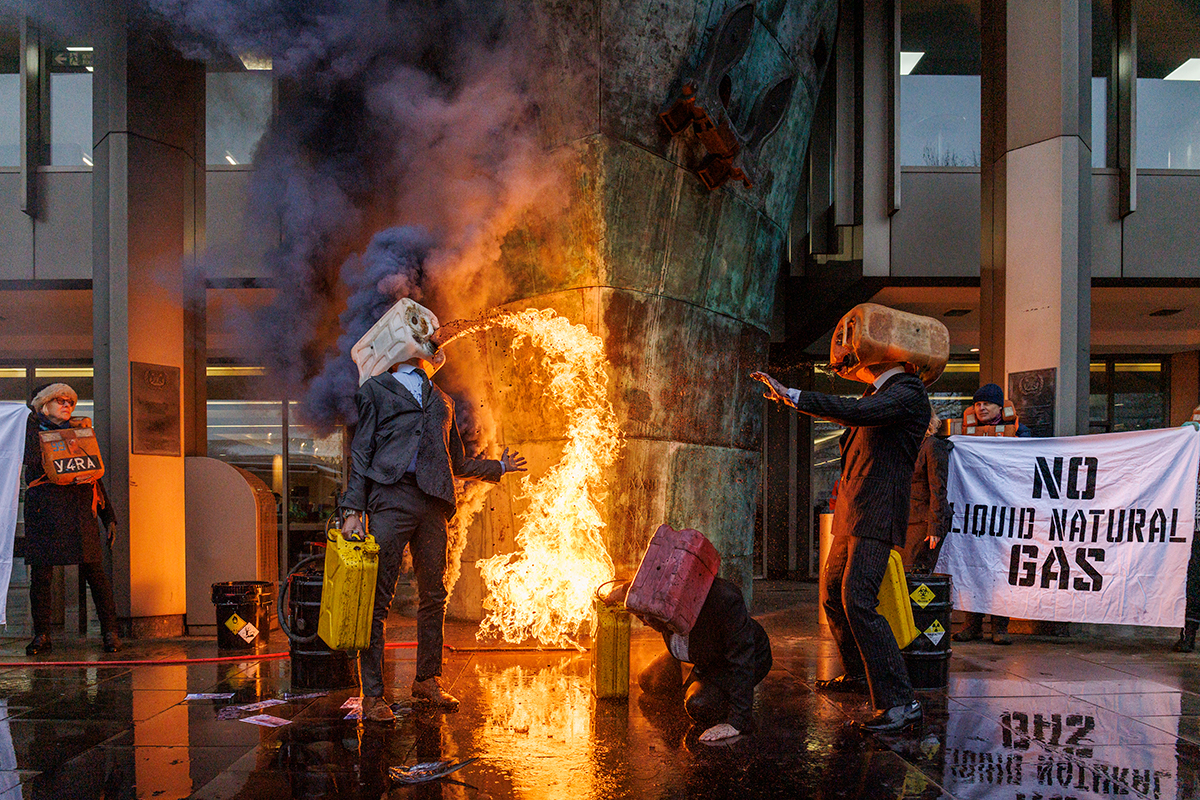
Liquid Natural Gas (LNG) – the facts
LNG is a fossil fuel that, when extracted, transported and burnt as a marine fuel, leaks methane into the atmosphere – a dangerous global-warming gas that is over 80-times more climate-warming in the short-term than carbon dioxide.
The UN’s Intergovernmental Panel on Climate Change (IPCC) identified rapid methane emission cuts as one of the top priorities in order to limit global warming to as close to 1.5°C as possible. The IPCC’s latest report focusing on climate mitigation makes clear that fossil gas in the form of LNG is not a solution for shipping’s decarbonisation.
Contrary to what climate science requires, shipping and port companies have been investing heavily in fossil LNG, alleging that the fuel will reduce their environmental impacts and climate pollution. There are currently over 785 new cargo ships on order globally, with over 400 being built to run on fossil LNG.
Burning more fossil LNG onboard vessels is a disaster in the making for our planet. It would only increase methane emissions from ships, which already rose by 150% between 2012 and 2018, according to the UN International Maritime Organisation (IMO).

The IMO is unfit for purpose
The IMO is clearly unfit for purpose. It only acts on behalf of the shipping industry and rarely considers the environment. It must halve shipping emissions now, we are already too late for some, but not yet for everyone. Add to this the IMO’s continued backing of the fossil fuel industry, by not taxing shipping fuel and allowing the dirty fossil fuel byproduct HFO to be burned at sea, plus its lack of regulation of hazardous petrochemical shipping, and the list of IMO misdeeds and wrong directions begins to get very long indeed. Given this ever expanding list isn’t it time the environmental remit of the IMO is governed by another, better, UN agency? Life is too important to be squandered by inept bureaucracy.
Ocean Rebellion demands:
The UN must form a new, transparent, and representative body to govern the Ocean for the benefit of ALL life. This new body must have the restoration and replenishment of the Ocean as its only measure of success. It should replace corporate power with people power. And it should represent the many forms of marine life who actually make the ocean a home.

Chris Armstrong, University of Southampton says:
“By avoiding simple solutions like slow sailing, wind, and less international commerce the IMO is condemning the Paris Climate Agreement to a slow death – death by a thousand meetings. We must Act Now to reduce shipping emissions. Commitment to Net Zero by 2050 cannot be used as a corporate ruse to avoid taking urgent action. Shipping needs a plan to rapidly decarbonise, starting now.”
Clive Russell from Ocean Rebellion says:
“We must act fast and listen to the scientists. Our greenhouse gas emissions are setting off a chain of events that’s tipping our environment towards climate chaos. Every moment we fail to reduce our consumption of fossil fuels and commodities we reduce the resilience of our ecosystems. With every day we fail to act, we move closer to dangerous tipping points with cascading knock-on impacts which look like being irreversible. There’s no time to waste, we must act now.”
Andrew Darnton adds:
“It’s called Liquid Natural Gas or LNG. It’s a fossil fuel. The UN IPCC has warned us we need to reduce fossil fuel use – how does building infrastructure to use more fossil fuels help us? LNG is not a solution, it’s just madness. Governments must stop listening to industry and start listening to the scientists, they’re all saying the same thing – DON’T USE FOSSIL FUELS.”
Sophie Miller adds
“Shipping emissions are causing elevated levels of atmospheric CO2, and the black carbon from heavy fuel oil (HFO) used in shipping, is causing accelerated melting of polar ice. HFO is a waste product of the oil industry, ships will run cleaner and better on distilled fuel. Ocean Rebellion calls for a ban on HFO, now.”
Rob Higgs adds
“Why not drastically reduce shipping emissions easily by slow sailing and retiring inefficient ships? Surely this is a minimal requirement, in the short term, to make the shipping industry consistent with Paris Agreement goals?
Roc Sandford adds:
“As the seas die we die. And the seas are dying. This is being accelerated by idiotic schemes like using ‘scrubbers.’ Ocean acidification is a devasting issue for marine life and scrubbers will only add to it. When Oceans cross a nearterm acidification threshold it really is all over, not just for marine life but for all life (that’s us too—without a living ocean we’re going to find it hard to breathe). What’s so hard about banning Heavy Fuel Oil instead? We need to stop thinking business as usual and start reacting as if this is a horrific and terrifying emergency–because it is.
Suzanne Stallard adds:
“The UN talks a great talk. The International Maritime Organisation, a UN body, is unfit for purpose. It’s corrupted by industry and uses its UN remit on behalf of industry. We’re living in an age of unprecedented ecological breakdown, the UN must recognise this by governance. We ask the UN to call out its rogue subsidiaries, still more harmful to life on earth than the rogue states we hear so much about.”
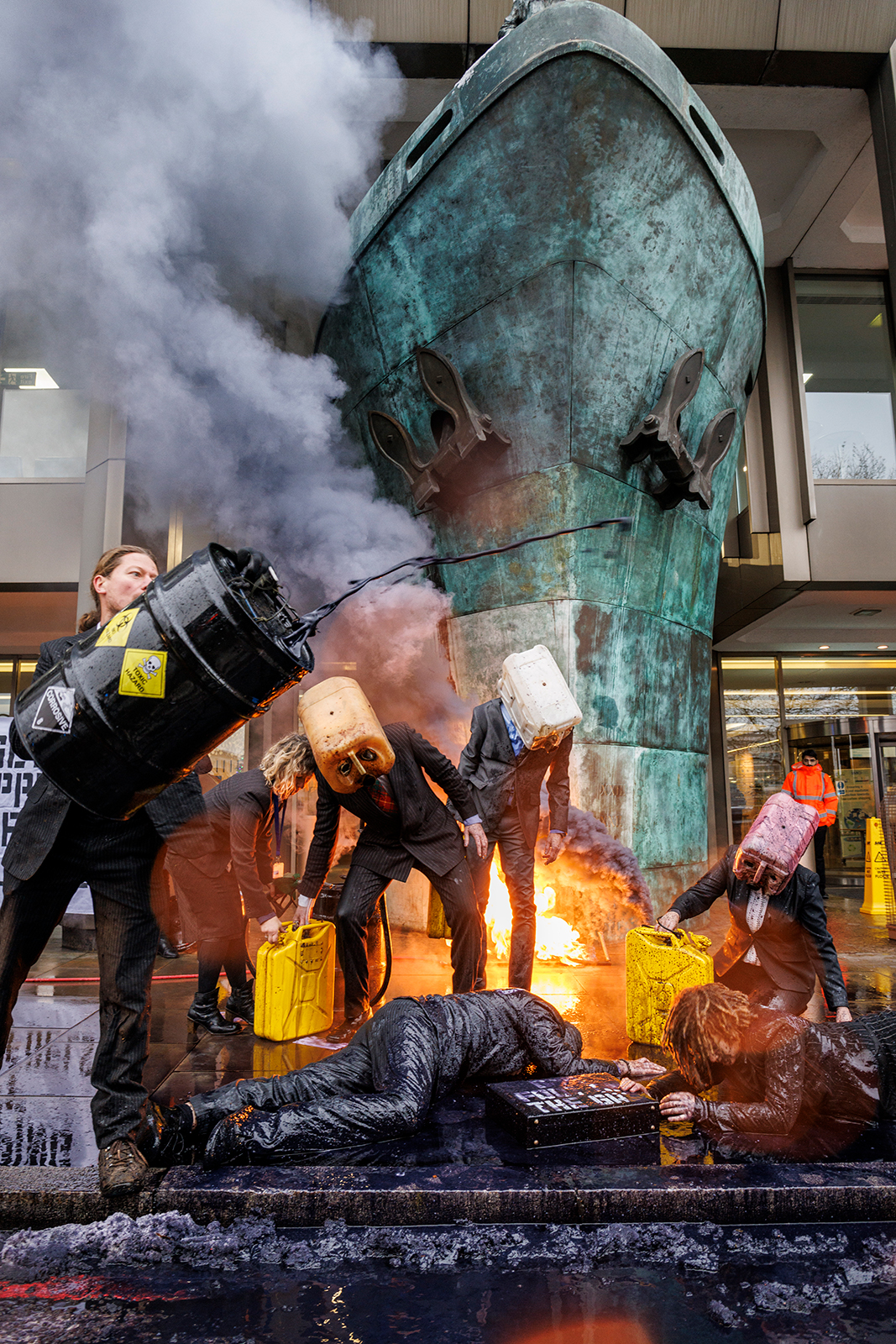
Photos from top: 1, 4, 5, 6 ,7, 9 and 10, Crispin Hughes; 2 and 3 João Daniel Pereira
Film by Alex Morgan
